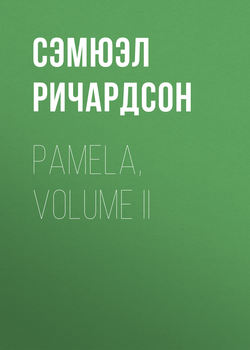Читать книгу Pamela, Volume II - Сэмюэл Ричардсон - Страница 27
LETTER XXVI
ОглавлениеMY DEAREST CHILD,
It may not be improper to mention ourselves, what the nature of the kindnesses is, which we confer on our poor neighbours, and the labouring people, lest it should be surmised, by any body, that we are lavishing away wealth that is not our own. Not that we fear either your honoured husband or you will suspect so, or that the worthy Mr. Longman would insinuate as much; for he saw what we did, and was highly pleased with it, and said he would make such a report of it as you write he did. What we do is in small things, though the good we hope from them is not small perhaps: and if a very distressful case should happen among our poor neighbours, requiring any thing considerable, and the objects be deserving, we would acquaint you with it, and leave it to you to do as God should direct you.
My dear child, you are very happy, and if it can be, may you be happier still! Yet I verily think you cannot be more happy than your father and mother, except in this one thing, that all our happiness, under God, proceeds from you; and, as other parents bless their children with plenty and benefits, you have blessed your parents (or your honoured husband rather for your sake) with all the good things this world can afford.
Your papers are the joy of our leisure hours; and you are kind beyond all expression, in taking care to oblige us with them. We know how your time is taken up, and ought to be very well contented, if but now and then you let us hear of your health and welfare. But it is not enough with such a good daughter, that you have made our lives comfortable, but you will make them joyful too, by communicating to us, all that befals you: and then you write so piously, and with such a sense of God's goodness to you, and intermix such good reflections in your writings, that whether it be our partial love or not, I cannot tell, but, truly, we think nobody comes up to you: and you make our hearts and eyes so often overflow, as we read, that we join hand in hand, and say to each other, in the same breath—"Blessed be God, and blessed be you, my love,"—"For such a daughter," says the one—"For such a daughter," says the other—"And she has your own sweet temper," cry I.—"And she has your own honest heart," cries she: and so we go on, blessing God, and you, and blessing your spouse, and ourselves!—Is any happiness like ours, my dear daughter?
We are really so enraptured with your writings, that when our spirits flag, through the infirmity of years, which hath begun to take hold of us, we have recourse to some of your papers:—"Come, my dear," cry I, "what say you to a banquet now?"—She knows what I mean. "With all my heart," says she. So I read although it be on a Sunday, so good are your letters; and you must know, I have copies of many, and after a little while we are as much alive and brisk, as if we had no nagging at all, and return to the duties of the day with double delight.
Consider then, my dear child, what joy your writings give us: and yet we are afraid of oppressing you, who have so much to do of other kinds; and we are heartily glad you have found out a way to save trouble to yourself, and rejoice us, and oblige so worthy a young lady as Miss Darnford, all at one time. I never shall forget her dear goodness, and notice of me at the Hall, kindly pressing my rough hands with her fine hands, and looking in my face with so much kindness in her eyes!—What good people, as well as bad, there are in high stations!—Thank God there are; else our poor child would have had a sad time of it too often, when she was obliged to step out of herself, as once I heard you phrase it, into company you could not live with.
Well, but what shall I say more? and yet how shall I end?—Only, with my prayers, that God will continue to you the blessing and comforts you are in possession of!—And pray now, be not over-thoughtful about London; for why should you let the dread of future evils lessen your present joys?—There is no absolute perfection in this life, that's true; but one would make one's self as easy as one could. 'Tis time enough to be troubled when troubles come—"Sufficient unto the day is the evil thereof."
Rejoice, then, as you have often said you would, in your present blessings, and leave the event of things to the Supreme Disposer of all events. And what have you to do but to rejoice? You, who cannot see a sun rise, but it is to bless you, and to raise up from their beds numbers to join in the blessing! You who can bless your high-born friends, and your low-born parents, and obscure relations! the rich by your example, and the poor by your bounty; and bless besides so good and so brave a husband;—O my dear child, what, let me repeat it, have you to do but rejoice?—For many daughters have done wisely, but you have excelled them all.
I will only add, that every thing the 'squire ordered is just upon the point of being finished. And when the good time comes, that we shall be again favoured with his presence and yours, what a still greater joy will this afford to the already overflowing hearts of your ever loving father and mother,
JOHN and ELIZ. ANDREWS.
